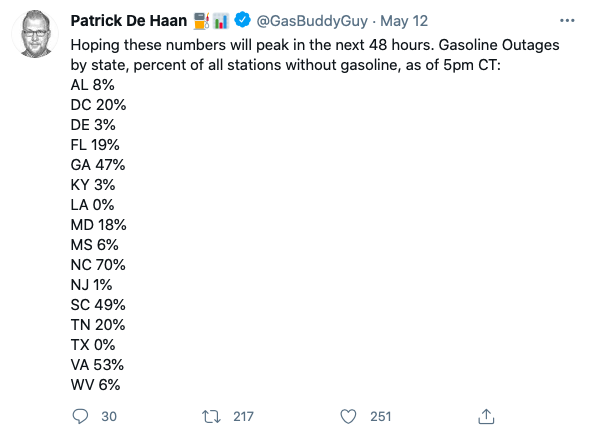3 Ministry Takeaways from the Colonial Pipeline Hack
On Friday, May 7th, the Colonial Pipeline suffered a Cyberattack. Because of the Cyberattack, they had to shutdown the pipeline. That is important because this pipeline supplies fuel for much of the Southeast up to Virginia and including Washington, DC.
If not addressed, this shutdown could have caused massive gas shortages for a period of time. The Colonial Pipeline did promise that by the end of the week, things would be restored back to normal and that there was no gas shortage. However, what ended up happening was that people started to panic and ended up flooding gas stations all over the Southeast and caused gas stations to run out of gas. Tuesday through Friday were panicked shopping days for people looking for gas. It even started affecting places outside of the pipeline’s reach. Here are some tweets from the time period.

What once started out as just affecting North Carolina the most, began to affect other areas.

But then it started effecting areas outside of their control.

Thankfully by Thursday evening the Colonial Pipeline opened back up and serve was slowly restoring to the affected areas by Friday. However, as of Sunday night, 81% of gas stations in Washington, DC still had NO gas. It was really too bad how this turned out to be such a problem because of panic buying.
So what does this hack on the Colonial Pipeline this teach us about ministry? Here are 3 things.
- Cyberattacks are real and can be devastating. Because of this, we need to protect out ministry accounts with tough passwords so they are not easily hacked. I discovered during covid and the Zoom bombings that hackers will attack any organization at any time for their benefit or enjoyment. So make sure your security system and accounts have strong passwords.
- Shortages can happen. It’s always best to be prepared. When you are out of supplies or close to out of key supplies, don’t wait to replenish them. Replenish them well in advance of when you need them. That way you won’t stress out too much when you actually need a certain item.
- People overreact. The gas shortage happened a lot sooner than people expected in part because people panicked and went out when they really didn’t need gas. People were filling up extra gallon tanks and canisters. Far more than what they needed. They completely overreacted as the government stressed to only get what you need. The pipeline was scheduled to be back online in plenty of time before a shortage actually happened. But, because of the panic buying, companies ran out quick. When people in your ministry panic, be sure to calm them down. A lot of the panic comes from irrational thinking and their minds go off. AS a minister leader, make sure you can be there to support and care for people when they do go through panic attacks. Here are some other suggestions for what you can do.
The Colonial Pipeline shutdown caused widespread panic all around the Southeast and wide Atlantic. It didn’t need to end up that way, but it did. In ministry you will encounter issues like this where there are hacks, panics and shortages. Hopefully we can all learn from this so that, when we do experience this, we can navigate it well and use it as a way to minister to people.
What do you think? What other ministry lessons can we learn from the Colonial Pipeline shutdown? Share your thoughts, experiences and questions below or on social media using #ymsidekick when you share. Let’s continue this conversation.
Want to learn digital tools to expand your reach in ministry? Join the Digital Bootcamp Facebook Group!

